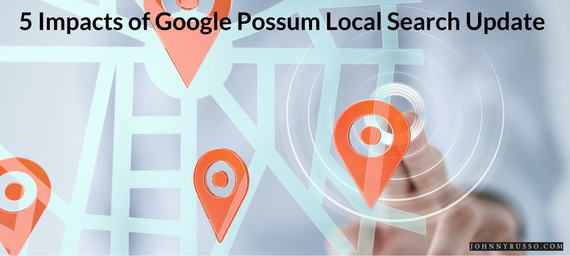In September 2016, Google refreshed its local search algorithm, and numerous local businesses were no longer found on search listings. Or so it appeared. Hence the name that local search expert Phil Rozer supposedly gave to the new update: Google Possum.
Essentially, the Google Possum update comes down to the fact that Google wants to merge local and organic search ranking signals. So they want to reward businesses that are locally the closest (physically), but who are also optimizing towards having great location data and relevant content for search.
How It Impacts Multi-Channel Retailers
This has a big impact for multi-channel retailers, or even businesses who have numerous offices spread across a country or city. Take Nordstrom, who by the Fall of 2017, will have opened 6 stores in Canada. Now, Nordstrom has a huge brand presence and their website will rank tremendously on search. However, if they don’t have a local presence in Saskatoon, for example, retailers like The Bay, Sears, or Mark’s (yes, I work here), that do have a local presence and are optimized for local search and SEO, would theoretically fare better. Got that? I hope. I know it can be complex. So let’s simplify this by listing the top 5 impacts Google Possum could have.
1. A User’s Physical Location has an Even Bigger Impact on Search Results
As Joy Hawkins stated in a Search Engine Land column, “The physical location of the searcher is more important than it was before.” Amen. Think mobile.
2. Geographical Proximity of the Business is Less Important
Businesses, especially those in service-related sectors, with a physical address outside the city limit saw a huge spike in rankings shortly after the Google Possum changes were made. When users include the city name in their searches it puts these businesses at a disadvantage. (For example, if a Montreal electrician’s physical head office location was in a nearby suburb, searchers in the Greater Montreal Area would have a hard time seeing that electrician’s business listing on Google – as in “electrician in Montreal”). Since the Possum update, city limits are playing less of a role. What Google is saying, in other words, is that a local listing not within a certain city made the search not as relevant for searchers in that city. Since the Possum update, city limits are playing less of a role.
3. Enhanced Filters on Addresses and Affiliation
Businesses with the same address and affiliation are being filtered out of local search results, and therefore not appearing twice. This will definitely help expand local results and prevent more spam from creeping into local search rankings.
4. Similar Keyword Optimization
The order of keywords has even more importance in the Google Possum update. Prior to this update, “Calgary coffee shop,” “coffee shop in Calgary,” and “coffee shop in Calgary, AB” would have yielded similar results. However, this small change can mean the difference in being in Google’s top 3-Pack SERP (Search Engine Results Page) position, so it’s now important to use multiple variations and iterations of keywords on different pages of your site.
5. Google Local Acting Alone
Google Possum is separating local search and organic impact, sort of. Possum is now showing results that essentially take into account two (different) search algorithm patterns. However, each is still very important for local rankings.
Have you seen any impact with your business or the way your business now ranks in Google Local Search Rankings?




Leave a Reply